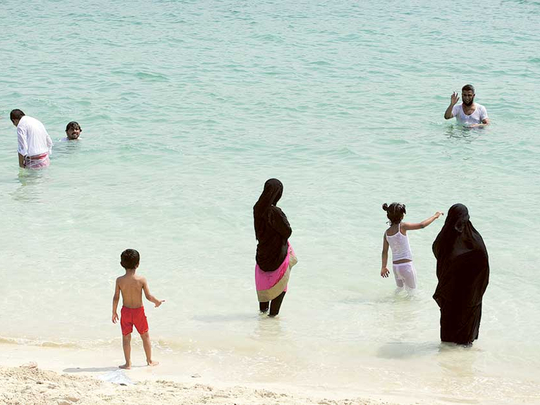
For any people who fast during Ramadan, doubts arise regarding certain situations and activities that could potentially nullify their fast.
Dr Ali Ahmad Mashael, a Grand Mufti at the Islamic Affairs and Charitable Activities Department in Dubai, explains what needs to be avoided during the fasting hours and clarifies some common myths that circulate due to lack of knowledge.
“Muslim scholars all agreed that whatever enters an open port [in the body] and makes its way to the abdomen will break a fast even if it’s part of a treatment procedure. This is something that every Muslim needs to understand and be cautious about during Ramadan,” he said.
Intentional eating and drinking, intentional vomiting, sexual intimacy between a married couple and vitamin injections, all these break a Muslim’s fast and are never debatable between the four [Islamic] schools of thought, said Dr Mashael.
Dr Mashael discusses other situations that many Muslims may face on a daily basis and clarifies whether or not they break the fast, are discouraged, or are debatable.
Taking a dip in a swimming pool or a shower
“Swimming doesn’t break a person’s fast but if water makes its way through the mouth into the throat or inside the nose, which in many cases is believed to reach the abdomen, then it can. Muslims fasting must avoid aggressive swimming strokes or showering or else their fast cannot be counted and they need to make it up after Ramadan.”
Accidentally drinking or eating while fasting
“When a person is forgetful, it means they unintentionally ate or drank, this doesn’t break their fast. Their fast is still valid. In the Quran, it says: ‘And there is no sin on you if you make a mistake therein, except in regard to what your hearts deliberately intend. And Allah is Ever Oft-Forgiving, Most Merciful’ [Al-Ahzaab 33:5].”
However, said Dr Mashael, out of the four schools of thought, Al Maliki requires the Muslim to make up the fast after Ramadan.
As for chewing gum or smoking, Dr Mashael said they definitely break the fast.
Brushing the teeth and gargling
“Muslims need to know that miswak is preferable and is encouraged to be used during fasting hours to brush the teeth and eliminate oral odour. Brushing your teeth using toothpaste and a brush is discouraged because the paste can reach the throat. It’s better to be cautious when it comes to these things.”
Health-related issues
Donating blood
“There is some debate on this between various Muslim scholars, but the majority agree that it doesn’t. The Hanabli school of thought believes it does.”
Water or ear drops entering the ear, nose sprays and eye drops
“Water or ear drops entering the ears are most likely to break the fast because they are open ports that can reach the abdomen. Nose sprays can also break the fast if they reach the abdomen, so people should take precautions. As for eye drops, scholars differ on this, so I recommend people avoid it unless they urgently need to take it during fasting hours.”
He said that some scholars may disagree about the nose spray just as some disagree that a sorbitrate, a pill placed under the tongue for patients suffering from heart problems, can break the fast.
Insulin injections for diabetic people
“Insulin injections do not break the fast, but people are advised to take doses to bring back the body sugar to the normal range. Taking too much can make the person hungry and may lead to breaking a fast.”
D. Mashael explained that there are two types of illnesses that determine whether a person should fast or not.
“If a person suffers from any type of illness that requires immediate medication, then that person is excused from fasting and must make it up. Fasting in this case can deteriorate their health and delay their recovery, this is why it is acceptable to not fast. However, a person suffering from a headache or any other illness that is tolerable can delay consuming their medication until Isha, Maghrib, or suhour. If the pain becomes intolerable, they do not have to fast.”
The elderly and permanently ill people who require continuous medication are excused from fasting.
Applying lipstick, nail polish and perfumes for women
“Applying lipstick is disliked because in most cases they contain fruit flavours or other flavours and these can reach the woman’s taste buds and throat when the tongue touches the lip. As for nail polish, it doesn’t break the fast but it must be removed before ablution because it does not allow water to touch the nails and the ablution then would not be deemed valid.”
Dr Mashael said all kinds of frankincense, if intentionally inhaled, will reach the abdomen because of the incense smoke and break one’s fast. “Other perfumes do not break a fast, but applying them is disliked during fasting hours.”
Cursing, shouting, lying, telling tales, falsely testifying, listening to music
“They do not break the fast, but engaging in such behaviours deprives the person of rewards and God’s forgiveness. Fasting is not only about refraining from eating and drinking.”
Commenting on the same situation was Khaleeq Ahmad Mufti, an Islamic scholar who explained why it is wrong to engage in such behaviours.
“A Muslim may have completed their religious obligations and fulfilled their responsibilities during Ramadan, and these behaviours can limit their rewards. It goes against the basic ethics and morals of fasting. Fasting is about disciplinary behaviour, not only about avoiding food. A person needs to stick to good manners during Ramadan,” he said.
Intimacy between married couples
Dr Mashael and Mufti both warned against engaging in any sexual behaviour during the fasting hours and to be cautious because a hug or a kiss could trigger such behaviour.
“If a person ruins their fast [due to sexual behaviour], they must do Kaffara, which means they either have to feed 60 people or fast continuously for 60 days,” said Mufti.












